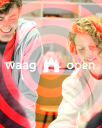In sustainability studies the 'rebound effect' explains why people use clean devices such as smart heating longer – it is economical and clean so leaving it on won't hurt. As a result, one could end up using the same amount of energy as with your old, inefficient heating. But also in 5G, the rebound effect is expected to occur – both in ways related to sustainability and 'smartness'. Should we throw ourselves enthusiastically into 5G, without thinking about how we use our internet connections in the future? A mini essay by Socrates Schouten (in Dutch).
Want to receive updates like this in your inbox?
Get notified about new updates, opportunities or events that match your interests.
Maybe you will also like these updates
Unmanned systems & sustainability @Formula 1

Unmanned systems; Developments & challenges
<strong>Pieter Elands,</strong> Program Manager Unmanned Systems at TNO, is an experienced manager of people and complex research programs. Pieter will share insights into the latest developments and key challenges in the field of unmanned systems. With a strong background in Aerospace and Defence, responsibility for coordinating research on unmanned systems and extensive knowledge of how unmanned systems are deployed in today’s military operations, the talk will explore technological, organizational, and strategic challenges.
Sustainability at the F1 Heineken Dutch Grand Prix
Dimitri Bonthuis is director Media & Sports Development at SportVibes and currently involved in major events like ABN AMRO Open and F1 Heineken Dutch Grand Prix. At the Dutch GP he is responsible for sustainability. This evening, Dimitri will talk about his experiences with sustainability at the Grand Prix, exploring how he approaches the topic, which innovations have been key, the challenges of driving sustainable initiatives, and how these efforts fit into a broader strategic vision.
21.00 Networking with coffee/tea
Sensemakers workshop on open source LLM's

Michiel Bontenbal will give a practical update on running open source LLM’s locally
De workshop is in het Engels maar we spreken ook Nederlands!
Waag Open: Quantum game night

Bij de eerste editie van Waag Open in het nieuwe jaar duik je spelenderwijs dieper in kwantumtechnologie. Kom langs bij deze game night op donderdag 8 januari en corrigeer samen met je medespelers fouten in kwantumcomputers.
Waag heeft in samenwerking met Universiteit Leiden een digitaal spel ontwikkeld, waarbij je jouw creativiteit inzet voor foutcorrectie in kwantumcomputers. Menselijke vindingrijkheid is nog altijd van grote waarde bij het oplossen van problemen. Precies dit is wat een machine learning-model nodig heeft om fouten in kwamtumcomputers ook op grote schaal te kunnen opsporen. Deze avond speel je het spel en leer je over kwantumtechnologie.
We trappen de avond af met een interactief gesprek over de maatschappelijke impact die kwantumtechnologie kan hebben. Aan het einde van de avond zijn we benieuwd naar jullie ervaring met het spel.
De avond wordt geleid door (spel)ontwerper Douwe-Sjoerd Boschman. Voertaal tijdens dit evenement is Engels. Voorkennis van kwantumtechnologie is niet nodig!
Programma
| 19:30 - 19:45 uur | Welkom & introductie |
|---|---|
| 19:45 - 20:15 uur | Interactief gesprek over maatschappelijke impact van kwantumtechnologie |
| 20:15 - 21:30 uur | Spelen van het kwantumspel |
Over Douwe-Sjoerd Boschman
Douwe-Sjoerd Boschman is freelance conceptontwerper voor interactieve media en schrijver van de prentenboeken serie 'Stout Konijn'. Als spelontwerper creëert hij dwaalsporen door de natuur, educatieve bordspellen over quantum technologie maar ook workshops en e-learnings – zoals de Nationale AI-cursus voor de Creatieve Industrie – over de invloed van nieuwe technologie op onze samenleving.
Toegankelijkheid
Mocht je krap bij kas zitten en wel graag aan dit evenement willen deelnemen, neem dan contact op met sanna [@] waag [punt] org. Het Waag-gebouw is niet toegankelijk voor bezoekers met een mobiliteitsbeperking. Bekijk hier onze toegankelijkheidsinformatie.
Waag Open
Elke eerste donderdagavond van de maand opent Waag haar deuren! Kom langs om te discussiëren en te doen. Want we gaan niet alleen in discussie over maatschappelijke thema's en de toekomst – je leert daarnaast ook altijd iets praktisch. Iets dat je altijd al hebt willen uitproberen, zoals de 3D-printer in het FabLab, of juist iets dat je nooit had verwacht, zoals uitpluizen hoe DNA in elkaar zit in ons biotech-lab. Waag Open vindt plaats in de maakplaatsen op de eerste en tweede verdieping van het historische Waaggebouw op de Nieuwmarkt.

